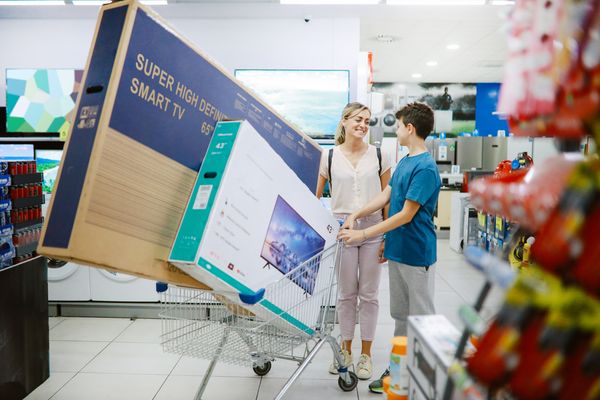Part of Best Buy's (BBY 1.99%) plan to become the "Ultimate Showroom" has been making deals with partners like Samsung and Microsoft to open branded mini-stores within Best Buy locations. At the end of 2013, Best Buy had opened 1,400 Samsung stores and 600 Windows stores within Best Buy locations. During the company's recent earnings conference call, CEO Hubert Joly hinted that more partnerships are likely in the works.
Well, it didn't take long for Best Buy to announce a new partnership. SolarCity (SCTY +0.00%), a solar-panel installer built around a leasing sales model, will set up tables in about 60 Best Buy stores in Arizona, California, Hawaii, New York, and Oregon. This follows a successful test run last year, and it gives SolarCity a way to expand its physical presence without the overhead of opening stand-alone stores. This partnership is good for both SolarCity and Best Buy.
What this means for Best Buy
As Best Buy has revamped its business over the past year, floor-space optimization has been a major focus. CDs and DVDs, once big sellers, were taking up too much space in stores, and partnerships with Samsung and Microsoft have gone a long way toward using that space more effectively. These stores-within-stores work well when the products being sold need to be explained, and consumer electronics like tablets and smartphones certainly fit that bill.

Source: Microsoft.
Best Buy also sells appliances, so the addition of a solar-panel salesperson isn't that much of a stretch. Solar City already has a similar deal with Home Depot, and that partnership has reportedly been working out well for the company. While the exact financial terms of the Best Buy deal weren't disclosed, Best Buy and SolarCity have agreed on a revenue-sharing model. Best Buy will receive a percentage of the determined value of each completed sale.
For Best Buy, this additional revenue stream will be essentially pure profit. The company is giving up a small amount of floor space in its stores, likely unproductive otherwise, and it gets in return revenue with a very high return on investment. While the numbers are unlikely to be big relative to Best Buy's total sales, this could open the door for other, similar deals, and it could also help drive more traffic to the stores.
What this means for SolarCity
The initial cost of installing solar panels on a home is prohibitive for most, but SolarCity solves this problem by leasing the panels to customers. Instead of paying for the panels themselves, customers pay SolarCity for the electricity over the length of a 20-year contract. In places where sunshine is abundant, this arrangement can lead to significant savings for consumers.

A home with solar panels installed. Source: SolarCity
But selling people on a 20-year contract takes some convincing, and having more salespeople on the ground, in areas with high foot traffic like Best Buy, will help the company tell its story and explain the benefits of leasing solar panels to potential customers. A greater presence should also help spread the idea that solar panels are not just for those with tens of thousands of dollars to spend, but that they can be affordable for nearly anyone.
The Best Buy deal should help SolarCity continue to grow its business at a rapid rate. The total number of active energy contracts more than doubled in 2013, and the company is closing in on 100,000 total customers. SolarCity expects to generate positive cash flow in 2014, finally reaching the point where money coming in from contracts starts to balance money going out to pay for new systems. There's certainly plenty of room to grow from here. While SolarCity's stock price seems detached from the fundamentals, trading at nearly 50 times trailing-12-month revenue, the company itself has a lot of potential.
The bottom line
The SolarCity partnership is another positive step for Best Buy, utilizing unproductive floor space in order to boost profitability. I suspect that this won't be the last deal Best Buy makes this year, and there are plenty of companies that would benefit from the increased exposure that a presence within Best Buy locations would provide. The deal should help SolarCity reach the masses, allowing the company to pitch its product to a new customer base, and it will further legitimize solar energy as a viable option in the minds of consumers. Like Best Buy's other partnerships, this deal provides significant benefits to both parties.





